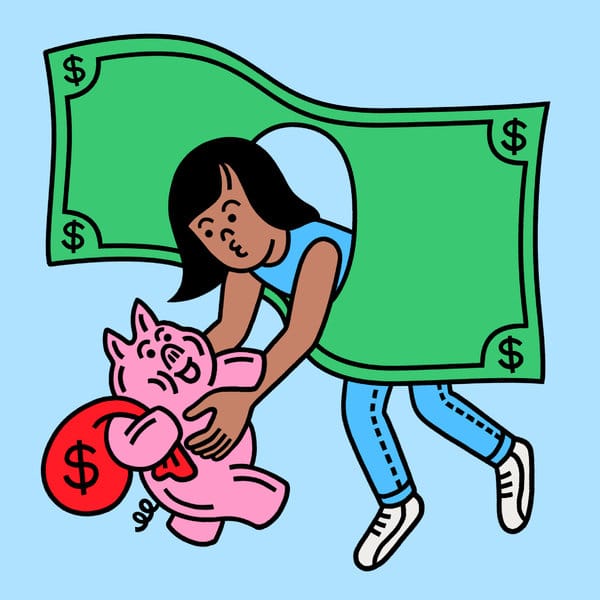Welcome to the Smarter Living newsletter! Every Monday, Tim Herrera emails readers with tips and advice for living a better, more fulfilling life. Sign up here to get it in your inbox.
I’m calling it right now: This is the summer of bad personal finance advice.
An industry of experts exists to advise us on how to spend our money. Some of those experts are truly on your side and sincerely want to help you be better with money. Some of those experts are … not exactly on your side, and are perhaps more interested in riling us up about our spending. It can be difficult to tell them apart, and it makes our already-fraught relationship with money even worse.
Earlier this month CNBC generated an outrage cycle about money advice by tweeting this story, in which the personal finance professional Suze Orman claimed that buying coffee means “you are peeing $1 million down the drain as you are drinking that coffee.” (Even the legendary writer Susan Orlean weighed in.) Earlier this summer, USA Today generated a similar negative buzz when it published an article from the money website The Motley Fool that claimed Americans waste an average of $18,000 a year on “nonessential items,” which they said included personal grooming, gym memberships, restaurants, coffee and lunch. These are all on top of similarly shaming articles that tell us we’re not rich because we sleep in and travel; because we buy shoes and jeans; and, of course, because we buy too much coffee.
While it is true that every one of us — including yours truly — can and should be smarter about spending, these small, sometimes necessary purchases are a just a sliver of a much wider story about our struggles with money that, in large part, can be traced back to the Great Recession, the debt load for younger Americans and broader trends about wage stagnation.
“For Americans under the age of 40, the 21st century has resembled one long recession,” the Times columnist David Leonhardt wrote earlier this year. “I realize that may sound like an exaggeration, given that the economy has now been growing for almost a decade. But the truth is that younger Americans have not benefited much.”
So, no, your coffee habit is not the reason you aren’t a millionaire, nor are the haircuts you get or the gym membership you have. But how can we improve our financial situation when we’re being shamed for enjoying a latte? Who can we trust? Is the advice we’re reading truly advice or is it meant to sell us something? It’s a mess!
To get some answers, I talked to an actual expert who is on our side: Tara Siegel Bernard, a personal finance reporter for The Times and one of the sharpest minds working in this space. Below is a conversation I had with her about the state of personal finance advice, along with what we can do to truly improve our financial well-being. (And let me know on Twitter what money-saving tips have worked for you.)
Tim Herrera: So I feel like we’re in this weird bubble where a lot of personal finance advice is centered around tiny expenses, like coffee, snacks, occasional lunches or other small indulges. I hate it! Those are usually the things that make life worth living! So I’ll start with the question we’re all wondering: Will skipping coffee make me a millionaire?
Tara Siegel Bernard: The short answer: no. It’s silly. It’s a superficial way to get at the “needs versus wants” question, but it’s not a particularly smart one. Or maybe it’s just easier to blame people for overspending on coffee because it’s a lot more difficult to give advice on the many things they cannot control: wages not keeping pace with the cost of living, the high cost of health insurance, housing, child care, paying for college, etc. But … coffee! You can control the coffee!
All of that said, we should try to be thoughtful about spending. We’re constantly making choices and trade-offs that affect our financial and emotional well-being. Should I pay more for housing so I can live closer to work and spend less time on the train and more time with family and friends? Or should I pay less for a home but increase my commuting stress? Those types of financial decisions — how much house to buy, for example, or buying a more economical car — will go a lot further than agonizing over lattes.
[Like what you’re reading? Sign up here for the Smarter Living newsletter to get stories like this (and much more!) delivered straight to your inbox every Monday morning.]
TH: Yes! And I feel that focusing on tiny purchases just ends up making people feel bad and shamed about their spending — like there’s something wrong with them because they lack the willpower not to buy a latte. We all have enough anxiety about money, why does this stuff keep coming up?
TSB: It seems like a quick fix, something we can easily control. But I’m willing to bet that the headlines that accompany these types of stories and tweets generate a lot of clicks.
TH: So while we’re doing a little myth-busting, are there any other especially bad pieces of money advice that have seeped into the public consciousness you’d like to shoot down?
TSB: There’s a myth, or at least a misunderstanding, that investing needs to be hard and complicated, or that you will do better with the more “sophisticated” investments that wealthy people have access to. It’s just not true. If anything, it’s often a marketing tool to push some newfangled mutual fund or investment that you just don’t need.
There is a learning curve, even with the most basic investments, for those just getting acquainted with saving and investing. But it can be boiled down to the following: Buy a collection of low-cost investments like index funds, which will track different certain segments of the stock and bond markets, that provide exposure to businesses around the world. The most important factor is coming up with the right mix of aggressive investments (stocks) and conservative ones (bonds) that you can stomach — and there are smart financial pros who can help you with that.
The quality of any advice you receive depends on who is providing it. Wall Street regulators just passed new rules that, advocates say, may make it even more difficult to distinguish between which financial pros are acting in your best interest. The onus remains on us to sort it all out.
TH: Clearing away all the clutter, very simply: What are a few things average people could do today or this week to improve their overall financial well-being?
TSB: It has become much easier to be an unconscious spender. Within a relatively short period of time, subscription-based businesses are everywhere, and they’re probably betting that most of us will forget to turn off these services when we don’t need them anymore. Unsubscribing to something is a quick little win. It’s not going to make you a millionaire, but you can comfortably buy a cup of coffee with the proceeds. You might also check out our 7-day Money Challenge, which helps you tackle one simple task each day to help improve your financial life.
Here’s another easy one: Do you know what sort of perks your employer provides? Do you commute to work? Do you plan on buying a new pair of glasses? Your employer might have programs that allow you to buy all of these things with money from your paycheck before it has been taxed. If you’re in the 24 percent tax bracket, that translates into a $24 discount on your $100 prescription sunglasses. You might also be able to set aside up to $5,000 pretax for child care expenses. Open enrollment for all of these things — commuter programs, flexible spending, dependent care accounts — tends to happen in the fall, so check with your employer if you haven’t already signed up.
Earning more money always helps, too. Keep a written record of your accomplishments at work and ask for raises when you can build a case. Research shows this can be particularly tricky for women, which is something I’ve written about over the years. (Here’s some advice on asking for a raise.)
It’s also worthwhile to take a deep dive into your finances once every three to five years to get a better grasp on where your money is going and how it’s working for you. I’m a fan of getting advice from a professional, even if it’s only occasionally, to help hold you accountable. (Just be sure the adviser promises to act as a fiduciary, which means your interests are always put first.)
TH: Last question: What’s one piece of financial advice you wish you had known at the start of your career?
TSB: I wish I would have been better at seeing how much more I could’ve saved and invested. I think I knew that I had to save enough to get a matching contribution from my employer, but I should’ve tried harder to see how much further I could’ve gone. It might not have been much, but it would’ve raised my consciousness on the whole “save early and often” idea, and how much that can help later in life. Just going through the exercise helps.
Best of Smarter Living
The Workplace Still Isn’t Equal for Women. Here’s Some Advice to Navigate It. A field guide for working women.
How to Keep Bedbugs From Coming Home With You Bedbugs peak in the summer, just in time for vacation. Here’s how to check your hotel bed for bloodsuckers — and what to do if you find them.
How to Organize Your Messy Contacts List The contacts list on your phone is probably less a list of people you talk to and more a list of everyone you’ve ever talked to. Here’s how to clean it up.
A Misfit’s Guide to Navigating the Office It’s possible to survive — and even thrive — as a misfit without forcing yourself into a round corporate hole. Here’s how to embrace your weird and successfully navigate the workplace.
How to Protect Your DNA Data Before and After Taking an at-Home Test Mail-in genetic tests offer a wealth of information about your ancestry and insight into medical risks — in exchange for a lot of data. Here’s where that data goes, and how to delete it.
4 Questions You Should Ask Before Buying a House With a Friend Friends and unmarried couples make up a growing segment of the housing market. If that’s you, here’s what you need to know before buying.
Tip of the Week
This week I’ve invited the writer Foram Mehta to give us a little lesson on the art of not butchering someone’s name.
During roll call, my teachers used to pause before sputtering out a chopped-liver version of my name. At appointments, interviews and coffee shops, it suffers a similar treatment. (That’s if people don’t freeze, waiting for me to break the painful silence.)
Butchering someone’s name is the ultimate of bad first impressions. So ensues a domino effect of uncomfortable social exchanges that at best sour someone’s day and at worst deem a relationship dead before it’s had a fair shot. “What’s in a name?” Shakespeare challenged. Well, easy for him to say. Try these tips next time the cat’s got your tongue over an unfamiliar moniker.
Don’t Assume
English class taught us to “sound it out,” but people’s names — especially those roughly transliterated from other languages — play by their own rules. Simply put: If you’re unsure if you know how to pronounce it correctly, you probably don’t.
Just Ask
The simplest solution of all is simply to ask, “How do you say your name?” Doing so is not only respectful, it saves about 10 minutes of correcting, joking and pretending the whole situation isn’t just awkward.
Spell It Out
If afforded the luxury (or if all else fails), there’s always the option of taking it letter by letter. Chances are the person whose name you handled with such tender care will make themselves known midway and, most important, be so grateful.
Click here to see the full story







